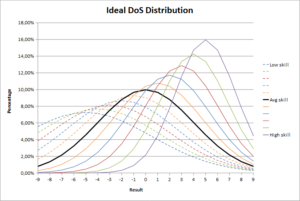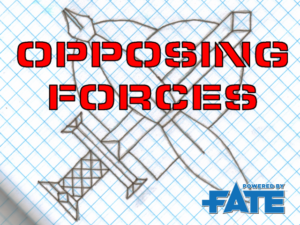 Most RPGs are predicated on the 50% success rule. Heroes will succeed half the time they attempt a task. Fate Core takes a quantitatively different approach by predicating on the 100% success rule. Heroes are equal to any task which they attempt to undertake. The static skills test throws the differences between the two approaches into stark contrast and highlights the effectiveness of each.
Most RPGs are predicated on the 50% success rule. Heroes will succeed half the time they attempt a task. Fate Core takes a quantitatively different approach by predicating on the 100% success rule. Heroes are equal to any task which they attempt to undertake. The static skills test throws the differences between the two approaches into stark contrast and highlights the effectiveness of each.
The 50% rule is seen most clearly in skill tests against a static difficulty. Pathfinder and the d20 games even have an option for players to automatically succeed at tasks within a certain difficulty range. This is known as Taking Ten or Taking Twenty because it assumes an average die roll. This type of mechanic evolved from the roots of the game as a tactical simulation, under the philosophy that success should be based on tactical choices rather than luck. When adapted for dramatic simulation, the die roll represents the effort of the characters in a very real way.
Fate Core also includes the option to bypass the die roll in order to assume success of any static difficulty which is equal to or less than the character’s skill. We will call this rule “Taking Zero”. Like Pathfinder, it also assumes an average die roll. The Fate Core book instructs players that dice should only be rolled when the outcome is in question or degrees of success or failure will make the game more interesting. It is, in effect, the same rule.
How does this change our approach to the game?
 If this were an exam, Pathfinder would be Pass/Fail, and Fate Core would grade on a curve. When you Take Ten or Take Twenty, your character may succeed at progressively more difficult tasks without undue stress. The opportunity is limited by the circumstances under which a character may choose to Take Ten or Twenty. If your skill is insufficient, you simply fail at the task. Another solution must be found.
If this were an exam, Pathfinder would be Pass/Fail, and Fate Core would grade on a curve. When you Take Ten or Take Twenty, your character may succeed at progressively more difficult tasks without undue stress. The opportunity is limited by the circumstances under which a character may choose to Take Ten or Twenty. If your skill is insufficient, you simply fail at the task. Another solution must be found.
The key difference lies in the way that Fate Core penalizes failure. By Taking Zero, your character succeeds at a task, but there is a minor cost. That cost may be expressed as a small penalty to a future action or as a complication within the story. But in Fate Core, success is always an option. Did your character fail the skill test by three shifts? No problem. He succeeds, but the price is progressively higher the greater the extent of failure.
This changes our approach to the game by allowing the characters to always succeed at static tasks but at the cost of future complications. Because the Fate Core system relies primarily on dramatic simulation rather than tactical simulation, the penalty for failure is seldom as straightforward as the loss of Hit Points. In this way, characters accrue penalties and complications to be leveraged against them during the course of the game. Because later penalties are directly related to previous success, this form of resolution creates stronger storytelling by using a callback to previous events. It is one of the tenets of circular storytelling.
Application in Action
In the early game, characters trade initial success for a more difficult challenge down the road. The easiest way to do this is to apply the cost of Taking Zero as an Aspect against the characters that opponents can tag for free in the late game, we’ll call this Stacking Consequences. But this is Fate, and players may well wish to bank negative Aspects which they can tag for Fate points when they start to run low.
In the mid game, Taking Zero keeps the characters on track and prevents derailing due to unexpectedly difficult challenges. It works the other way around as well. When prepping for the endgame, players can accept higher difficulties when Creating Advantages too be used later. In this case, a die roll is still required, but a quick glance at the probability chart shows that even when the target difficulty number is zero the chance of success on the die roll is about 60%.
In the endgame, this principle prevents the action from getting bogged down when a single task becomes critical. Fate Core has a related mechanic built into the system; characters may concede a conflict and retain some control over their fate. Extending this concept against static skill checks lets players essentially “concede” to the difficulty of the task and continue to participate in the story even when their skills have failed.
Taking Zero and conceding a conflict both manage the difficulty of an adventure as it progresses. If the point of the game is to move the action forward and keep the party from getting bogged down in the details, you will find them to be essential tools in your GM toolbox.
Last 5 posts by Winston Crutchfield
- Disney Kingdoms comics - July 7th, 2017
- Sonic the Hedgehog - June 19th, 2017
- He-Man / ThunderCats - June 5th, 2017
- Scooby Apocalypse - May 15th, 2017
- Wacky Raceland - May 1st, 2017

